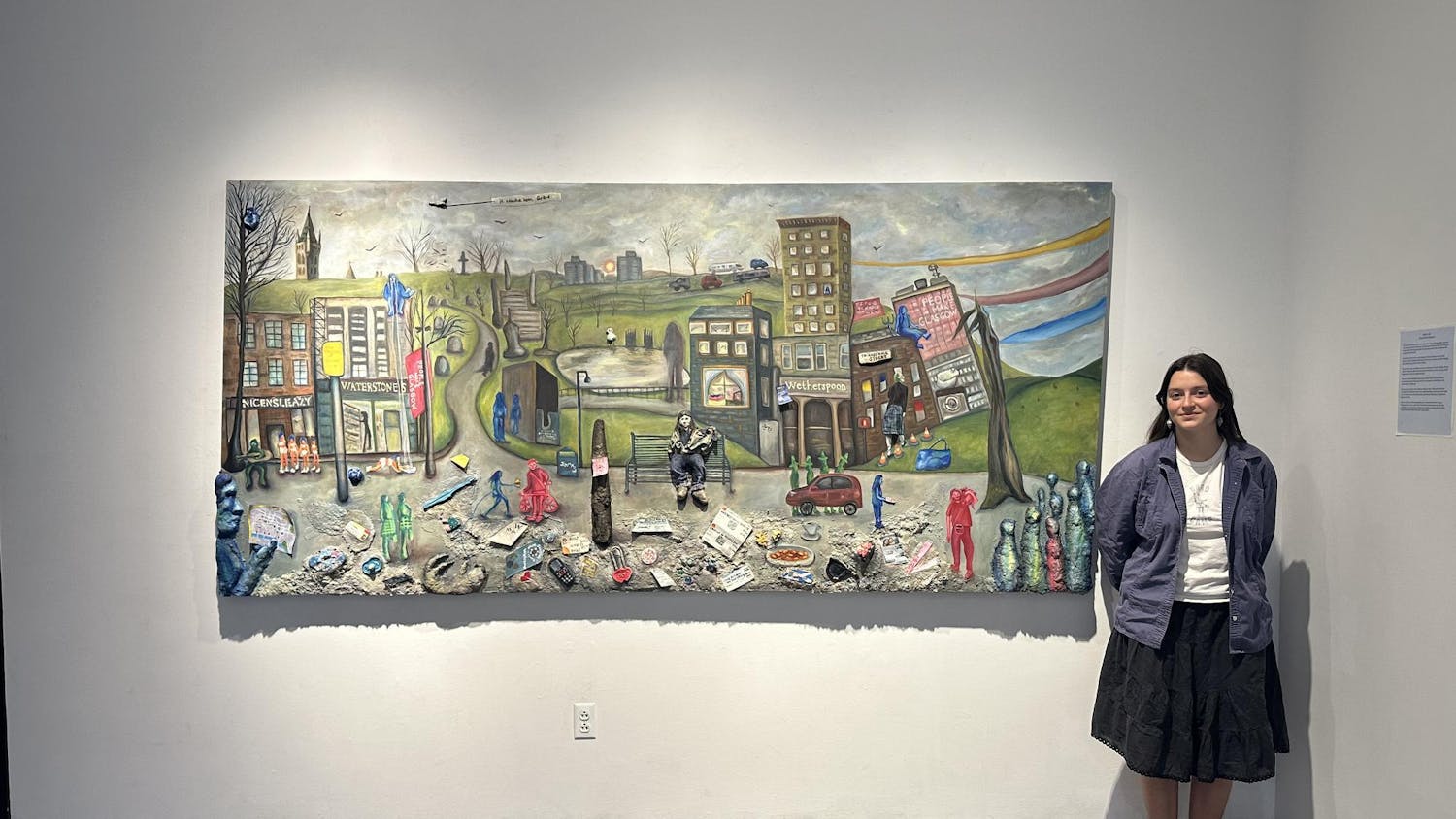Sundance Film Festival draws Hollywood stars ready to hit the slopes, and Festival de Cannes attracts A-listers looking to lounge on yachts. But there are few festivals where audience members leave their backpacks in the aisle while rubbing shoulders with acclaimed film veterans.
What distinguishes the Ivy Film Festival from these world-class festivals is that it is a college event with college students — the best of campus culture and the best of film.
The 12th annual IFF included advanced screenings, student film selections and industry guests. Festival Directors Mahima Chawla ’13 and Evan Sumortin ’13 led a student organization of 22 coordinators and 74 staffers to put on the festival.
Both Chawla and Sumortin said they were excited and surprised by the turnout at many of this year’s events.
“What we were most excited about this year was the great attendance, especially for our official selections, which we really concentrated on this year,” Sumortin said.
Chawla attributed this increased student attendance to their recent attempts at publicity, including giving out popcorn on the Main Green.
Chawla and Sumortin have directed the IFF since the beginning of the academic year, putting on nine events throughout the fall and spring.
“We wanted the lead-up to the festival to be huge,” Chawla said. “I think people started to trust our judgment about what we were doing.”
Though a necessary step, high attendance was not the goal of the festival. Chawla said the festival was not very different from those of past years, but there were certain aspects they wanted to emphasize.
“This year, we had a little more focus on documentaries that people wouldn’t normally get to see,” Sumortin said. As part of this effort, they hosted a series called Stories for Change throughout the year, which included screenings of documentaries on important social issues.
But the organizers of IFF wanted students to do more than just watch movies — they wanted students to learn how they are made. “We definitely wanted to cover all areas of the industry, which is why we had a screenwriter, we have a director, we have the producers,” Chawla said. “We wanted to focus on all those things that student filmmakers in particular would be interested in, not just one big star or one big actor.”
Wes Craven: A monster misunderstood
To a crowd of audibly excited students at the packed Perry and Martin Granoff Center for the Creative Arts Sunday afternoon, film director Wes Craven spoke candidly about his religious upbringing, the invention of Freddy Krueger and the inner workings of the mind of the “Master of Horror.”
“I’ve had a lot of people say, ‘I wouldn’t want to go inside your mind,’” Craven said. “I have a very peaceful mind ... I’m actually interested in comedies and love stories, too, but no one will hire me for that.”
Craven, who directed many modern horror classics such as “The Hills Have Eyes,” “A Nightmare on Elm Street” and “Scream,” answered questions posed by the audience and moderator Michael Siegel, visiting professor of modern culture and media. Craven was honest and funny when answering the thoughtful questions posed by a moderator who was clearly a genuine fan of the director’s work.
Craven began his film career as a messenger at a post-production company in New York after leaving jobs teaching at a university and a high school. “Don’t even worry about pay,” he advised aspiring student filmmakers. “Just get through the door.”
Soon after entering the industry, he wrote his first film, “The Last House on the Left.”
“I had never even seen a scary movie,” he said. “People thought we were horrible people for making that film.”
Because of his upbringing as a fundamentalist Christian, Craven questioned his role as a director of horror films.
“I was uncomfortable with my job. I thought maybe what they said about people who can’t accept God into their heart ... maybe they were right,” he said.
Craven also discussed his inspiration for the character of Freddy Krueger from his 1984 “A Nightmare on Elm Street.” The character was born when Craven read a newspaper article about a boy who was afraid he would die if he fell asleep and who, after five days of staying awake, fell asleep and died. The face of Freddy was inspired by a man Craven saw staring at him through his childhood bedroom window in the middle of the night.
But Craven did not come off as someone who relishes the horrendous and hard to watch. On stage he spoke casually with his wife who was flitting around the audience, taking pictures with an iPhone. He cracked jokes about a boy in the front row, who he said was too young to be there. And he likened his creative process to “doing the New York Times Saturday crossword puzzle — you just keep looking at the damn thing.”
Craven stayed around after the event for over half an hour, taking pictures, signing autographs and giving advice to aspiring filmmakers. He even gave one student actress the name of a casting agency in New York, telling her to tell them Wes Craven told her to call.
Mark Heyman: An up-and-coming alum
Screenwriter Mark Heyman ’02 returned to campus last week for a screenwriting master class, where he discussed the experience of writing “Black Swan” and working with acclaimed director Darren Aranofsky.
“It’s nice to be back at Brown,” he said as he walked on stage. “You have very nice buildings now. They really stepped up their game.”
About 130 students gathered in Granoff Friday to hear Heyman, who looked like a stereotypical former Brown student with black-rimmed glasses, a striped t-shirt and a blue-grey cardigan, answer questions about his career. His advice to students seemed especially valid and relatable because his path originated at Brown as a modern culture and media concentrator.
“Part of writing screenplays in general is that it’s just a blueprint,” he said. “A team of people are going to come breathe life into it, so it’s really just a skeleton.”
Heyman said he mostly wrote fiction in college, so he didn’t make the jump to screenwriting until after his time studying film at New York University, which he attended directly after graduating from Brown. He said the transition from fiction to screenwriting was natural for him, adding that he wasn’t very good at fiction.
He said he did not like the level of description fiction requires. “Dialogue’s more fun, and you can just move through the pages,” he said.
Heyman seemed surprised when he asked how many aspiring screenwriters were in the audience. “Wow, that’s more than I thought. This is like the sadomasochistic group.”
He proceeded to give students advice about making it in screenwriting, which felt more relevant because of his recent entry into the industry. He said writing films was still “new to (him), which is sort of an asset and a liability at the same time.”
Heyman met Aranofsky, the director of “Black Swan,” while staying behind to take a photo for a friend after a class at which the director was a guest professor. Heyman acknowledged that it doesn’t help students much to hear it was a lucky circumstance that put him in contact with the director who later asked him to write an Oscar-nominated film. When he was in school, he said, industry guests would always say their careers began when “(they) sat next to so-and-so on the plane” and how that wasn’t helpful to him as an aspiring writer. He jokingly admitted, “Now I’m that asshole.”
Producers panel: Advice for the aspiring
Saturday at noon, IFF held its first-ever Producers Panel, a conversation with three successful film producers, two of whom are Brown alums. The panel included Christine Vachon ’83, producer of “Boys Don’t Cry” and “Far From Heaven,” Brad Simpson ’95, producer of “Diary of a Wimpy Kid” and “World War Z” and Michael Shamberg, producer of “Pulp Fiction” and “Erin Brokovich.”
“A lot of people don’t know what a producer does,” Sumortin said. “They’re sort of the gatekeepers for making a film, so knowing what they do and knowing what they work for is especially helpful for student filmmakers and screenwriters.”
One of the goals of the panel, and the festival as a whole, was to provide Brown and visiting student filmmakers with access to advice from industry experts, Sumortin said. The producers took the opportunity to tell the audience, a group of about 100 students and adults in Granoff Center, what they have learned in their careers thus far.
“You can do anything in the film business if you do it yourself,” Shamberg said. “If you have a good script about anything, you can get it made ... as long as you don’t expect to get paid.”
He told the young members of the audience to “find the talent of your generation” and then “attach yourself to their short film(s).”
Sumortin said he wants to be a producer, “so it was kind of selfish of me to get a panel of a lot of my idols.”
But he wasn’t the only one interested in the advice the producers offered. IFF events coordinator Jose Samuel Clair ’14, who also hopes to be a producer, said he thought the panel was very educational.
“It’s great to hear from two very well-known producers who are Brown alums and seeing what they were able to do afterwards,” Clair said. “It was very reassuring to hear the things that producers do.”
Student films: When the attendance reflects the quality
This year, the IFF selected about 30 films made by graduate and undergraduate students from 21 different countries to be screened in one of the four IFF selection screening blocks.
Yesterday, an awards ceremony was held awarding one film from each category, including an audience choice award, which audience members voted on at the end of each screening block.
To advertise the films, IFF made a trailer with small previews of the films, which they hoped would show students the caliber of the official selections.
“We started playing (the trailer) before all of our films,” Chawla said. “After watching the trailer, people could gauge the high quality of films.”
Sumortin said they wanted students to know how competitive it is to get a film accepted as an official selection, a challenge that no one understands more than the visiting student filmmakers. These visitors went to events, watched their own screenings and attended the awards ceremony.
Cory Zapatka made the official selection “R,” which won an award in the experimental category. The film was Zapatka’s thesis at Rhode Island School of Design, from which he graduated last year, and this is the second festival to which his film has been accepted. Like many of the filmmakers visiting this week, Zapatka attended the screening of his film so he could watch the audience reactions in person.
“My film has a very dark story to it, and the silence that people had during it was very interesting,” he said. “There were a couple chuckles at a line that I had never heard people chuckle at. I couldn’t tell if maybe they thought it was a corny line.”
Though it was an educational experience to watch the audience watch his film, he said the process involved a lot of anxiety.
“It just makes time slow down a little bit. Once you see the film start to project, you kind of go numb,” Zapatka said. “You’re more concerned about the people who are watching it as opposed to the film itself.”
Zapatka, who saw a number of the other official selections at the festival, echoed Chawla and Sumortin when he said he was impressed with the quality of the student films.
“The caliber of films in this festival was just so high,” he said. “Even the films that I perceived to be the least strong were still incredible.”
Advanced screenings: Night vision
This year, the IFF brought many screenings to campus of movies not yet released. A few of these advanced screenings, such as “The Way, Way Back” and “The East,” included men in suits surveying the theater with night-vision cameras to ensure no student recorded the films. The turnout was high for most screenings.
The Avon Cinema was almost at capacity for the screening of “The Way, Way Back.” The film, which will be released in early July, was directed by Jim Rash and starred Steve Carrell, Sam Rockwell and Amanda Peet.
At least 50 students did not get into the screening of “Kings of Summer” last Thursday at Granoff. People stood against the back wall and sat on the air conditioners while a line stretched almost to the front door of the building. The film, directed by Jordan Vogt-Roberts, is a coming-of-age comedy about three teenage boys who move to the nearby woods. This was one of the best-attended events of the festival, and the crowd was eager to participate in the experience, laughing at jokes and applauding at climactic moments.
Another well-attended screening was “The East,” starring Brit Marling, Alexander Skarsgard and Ellen Page, which will be released at the end of May.
Other advanced screenings included Providence local Laura Colella’s “Breakfast with Curtis” and “The Reluctant Fundamentalist,” which was followed by a question-and-answer session with director Mira Nair. A collection of documentaries, such as “After Tiller,” “Sons of the Clouds” and “Searching for Sugarman,” were also screened.
To generate excitement for Wes Craven’s visit, there was a midnight screening of “Scream” on Friday that filled Granoff to capacity, and the students in the crowd were restless, loud and partially intoxicated, creating the perfect environment for a horror film.
The crowd laughed every time a character mentioned a “cellular phone.” One student yelled, “It’s not him!” at the screen, and another, “Where the tits?” through a collage of catcalls. When a girl was eating ice cream during a scary part of the film, one girl yelled out, “Ice cream,” presumably a pun on, “I Scream,” and the audience erupted in laughter and applause. Wes Craven would have been proud.

ADVERTISEMENT




